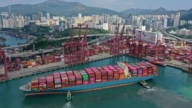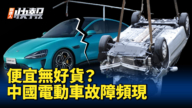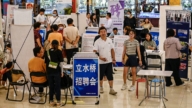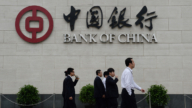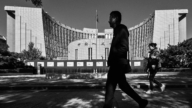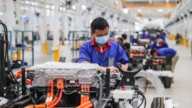【新唐人2014年03月07日讯】日前,上海“超日太阳能科技股份有限公司”表示,将无法向投资者全额支付即将到期的债券利息,而这次中共政府也没有像以往一样出面救助。评论认为,今年中国大陆,可能将出现大面积的信用及债券违约现象,政府同样没有钱,不会继续救助,民众有必要看紧自己的钱袋子。
“超日太阳”日前宣布,对于两年前发行的10亿元人民币债券,公司无力支付,应该在3月7号到期的大约人民币9000万元的利息,由于不可控因素,公司只筹集到400万元人民币支付。
“超日太阳”是一家生产太阳能板的企业,有报导说,“超日”公司本部生产线已经陷入停产,公司仅剩下位于九江,和洛阳的两家子公司在经营代理加工业务。
“超日太阳”常务副总裁陶然在接受国外媒体采访时表示,目前已不指望从金融机构,和地方政府取得支持,公司已经着手变卖海外的部分电站项目,但出价太低,目前正在协商。
大陆经济学者邓先生:“救命稻草政府不会再给他了,这是肯定的,因为政府也没有钱,政府管实际就是全民买单,这样造成的恶果就是压制和带坏其他的模式。”
实际上,“超日太阳”并不是中国第一家面临违约困境的公司。上个月,“山西联盛能源有限公司”因为接近300亿元的金融负债,无法支付工资、税款、工程款等,由于资不抵债,公司在当地政府的帮助下,开始破产重组。
1月31号,“中诚信托诚至金开1号”集合信托产品,30亿元债券也面临违约,最终由当地政府兜底解决。不过还是不能支付第三期利息。
美国南卡罗来纳大学艾肯商学院教授谢田:“我们不知道它那些救助的背后有哪些私人利益的交换,为什么要救助,救助时拿的是政府的钱,实际是拿着公众的钱,在挽救一小伙公司的拥有者,本来就是一个劫贫济富的过程,不光是不合法的,在道德上都是站不住脚的。”
2月下旬,“中信证券”发布报告,估算2014年将有7966只信托产品到期,规模合计9071亿元,考虑利息支付的因素,本息合计1万亿元。
中国金融资讯平台《华尔街见闻》网,日前整理出12支今年违约风险高的信托产品。根据美国银行的分析报告,《华尔街见闻》的报导形容中国的信托违约,犹如一触即发的火药筒,同时强调,“美银”分析报告的数据,实际上只覆盖了中国信托市场的1/8。美银估计,截至1月底,中国企业债市场规模高达8万7000亿人民币,远远高过 2007年底的8000亿人民币。
另外根据大陆理财网站报导,中国2014年面临高违约风险的信托产品,达14款。
谢田:“在中国政府幕后大力担保的情况下,这么多企业、债券都陆陆续续出现违约,是中国整个信贷市场、债务市场大面积崩溃的第二枪了,大面积违约开始发生的时候,地方政府想去保护也没办法,因为地方政府本身也债台高筑。”
据美国《华尔街日报》分析,用高利贷避免违约会导致风险更高的放贷行为,可能造成已经存在产能过剩问题的行业,出现更多的投资浪费。
那么,面临如此多违约的债务到底怎么解决?
邓先生:“克服的方式有几种,协调、转移、拖延、消化、转嫁,你的问题实在很严重了,我们只好把矛盾上交,让中央政府去裁制。”
谢田:“资本主义不光只有市场经济,同时还伴有公平的竞争,合理的法律制度,和自由的舆论监督,在中国是没有的,权贵资本主义,假藉资本主义的融资方式来聚敛钱财,但是政府并不是公正的,也没有自由的媒体把公司的财务、人事状况、背后的机密都公布出来。”
美国南卡罗来纳大学艾肯商学院教授谢田指出,在西方社会,政府官员和企业之间不会有利益关系,但是政府出资解决企业困境,也是行不通的。当年美国政府救助底特律汽车公司,就遭到民众反对。
采访编辑/刘惠 后制/钟元
Credit and Bond Train Wrect – Debt Time Bomb Is On Brink of Explosion
Shanghai Chaori Solar Energy Science And Technology Co., Ltd
recently indicated that it would not be able to pay investors
the full amount of interest on maturing bonds.
This time the Chinese Communist Party (CCP) government
has not come forward to the rescue.
Critics speculate that large scale credit and bond defaults
might happen in China.
The government also has no money, so it will not continue to
come to the rescue.
People need to closely watch their money.
Shanghai Chaori Solar Energy Science And Technology
Co., Ltd (Chaori Solar),
recently has announced that it was unable to pay the 90
million yuan interest due on March 7 of the 1 billion yuan
bonds issued two years ago.
Due to uncontrollable factors, the Company only raised
four million yuan for the payments.
Chaori Solar is a manufacturer of solar panels.
Some reports indicated that the production line
at its headquarters has stopped.
The company only has two subsidiary offices located in
Jiujiang and Luoyang for agent processing of business.
Chaori Solar Executive Vice President Tao said
during an interview with foreign media,
the company does not expect to get support from
financial institutions or local government.
The company has started to sell some of its
power plant project abroad, and is currently in
negotiation due to the low bids.
Chinese economist Mr. Deng:
“The Government will not provide the last straw for survival.
That’s for sure, because the government has no money.
Government bailout is to let the people pay for it.
The consequences are repression and degeneration."
In fact, Chaori Sola is not the first company in China
that faces default.
Last month, Shanxi Liansheng Energy Co,.Ltd
began bankruptcy reorganization with the help of
the local government,
because it could not pay wages, taxes, projects
due to its nearly 30 billion yuan financial liabilities.
On January 31, trust products of 300 million yuan bonds of
Zhongcheng Trust Chengzhijinkai Number One
was facing default.
It was eventually resolved by the local government.
But they still cannot pay the interest on the third phase.
Professor Xie Tian at Aiken School of Business
University of South Carolina: “We do not know the interests
behind those bailout, why did the government rescue,
did government use its own money or people’s money
to save a small number of business owners?
It has always been a process of robbing the poor
to help the rich. It is not only illegal, but also immoral."
In late February, CITIC Securities issued a report
estimating 2014 will have 7,966 trust products due
in the amount of 907.1 billion yuan.
With interest payments added, the total is one trillion yuan.
China’s Financial Information platform wallstreetcn.com
recently ranked 12 trust products with a high risk of default in 2014.
According to a report of Bank of America, http://wallstreetcn.com
describes China’s default of trust as an explosive gunpowder barrel.
It also stressed that the data of Bank of America’s report
only covers 1/8 of China’s trust market.
Bank of America estimates that as of the end of January,
Chinese corporate bond market is 87,000 billion yuan,
much higher than the 800 billion yuan at the end of 2007.
Also, according to a report from a financial website,
there are 14 products facing a high risk of default in 2014.
Xie Tian: “With Chinese government as the strong guarantor,
so many companies and bonds still result in default.
This is the second blow to the entire credit market in China.
Local government cannot help with such large scale default,
as local governments themselves are deep in debt."
According to the U.S. Wall Street Journal analysis,
to avoid default with usury would lead to
higher risk of lending behavior,
and may result in the already existing overcapacity
being a more wasteful investment.
So, what is the solution for so much debt default?
Mr. Deng: “There are several ways to overcome the issue.
Coordination, transfer, delay, passing, etc.
If the issue is really very serious, it is handed over to the top.
Ask the central government to handle it."
Xie Tian: “Capitalism is not only about market economy,
it also has fair competition, a reasonable legal system and
freedom of public expression.
China does not have these. China is about crony capitalism.
It uses the capitalist mode of financing to amass money.
The government is not fair, nor is there free media
to publish the inside information of finance, personnel and etc."
Xie Tian pointed out that in Western society
there is no collusion between government officials and businesses.?
If the government bails out enterprises, it is not feasible.
When U.S. government tried to bailout auto companies in Detroit,
it faced public opposition.
Nevertheless the US Government went ahead with the wholesale
bail-out a wide variety of businesses.
Interview & Edit/Liu Hui Post-Production/Zhong Yuan


